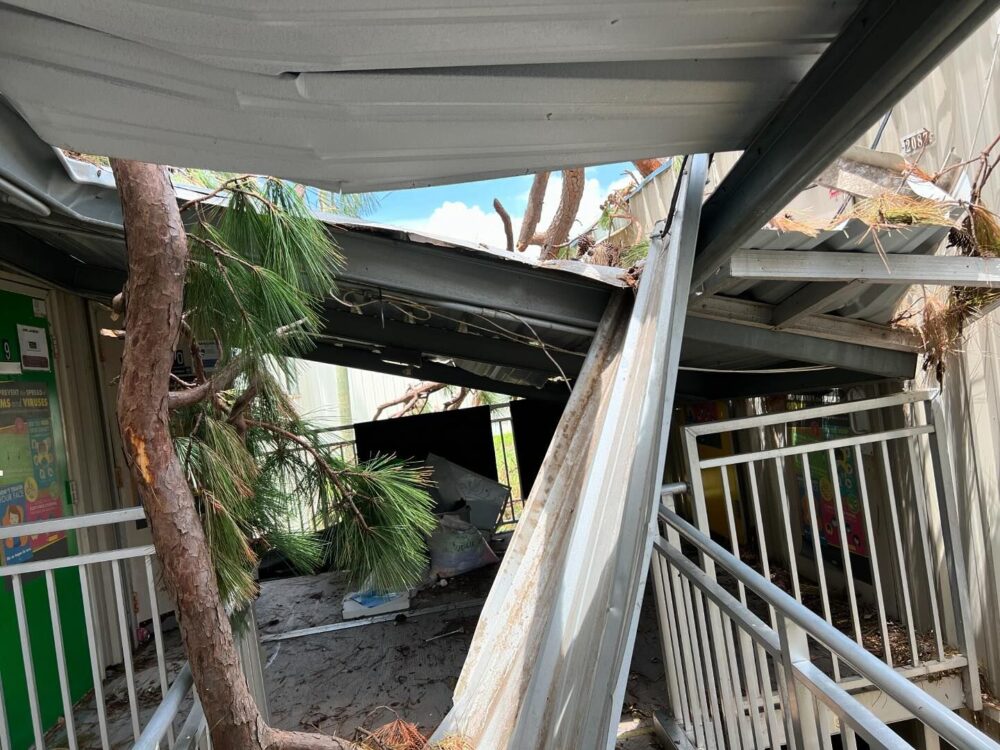About 68% of recently surveyed Houstonians said they felt prepared for Hurricane Beryl, which made landfall in Southeast Texas one year ago Tuesday.
However, about two-thirds of those residents said they believed local and state officials were unprepared for the category 1 storm that passed almost directly over the city. About 6 in 10 residents said officials were not adequately prepared, according to data from Rice University’s Kinder Institute for Urban Research.
As the Houston region marks the one-year anniversary of the storm — which caused more than 40 local deaths and led to widespread, prolonged power outages — local experts said it’s important for leaders at all levels of government to look at what they can do to prepare for increasingly intense weather as a result of climate change.
The anniversary of Beryl comes as the state grapples with historic and deadly flooding in the Texas Hill Country over the Fourth of July weekend. More than 100 have been confirmed dead as of Tuesday, and several of those reported dead or missing are from the Houston area.
“We’re trying to make reasonable assumptions about a subject that is, frankly, not reasonable these days,” said Jim Blackburn, the co-director of Rice University’s Severe Storm Prediction, Education and Evacuation from Disasters Center. “There’s nothing reasonable about climate change.”
After Beryl battered the Houston region with 80-mile-per-hour winds, millions of residents lost power for several days, drawing intense scrutiny of utility company CenterPoint Energy, which supplies electricity to much of the region.
In response to a request for comment about its adjustments after Beryl, CenterPoint said it had launched the Greater Houston Resiliency Initiative after the hurricane, leading to a 50% reduction in power outages each month compared to last year.
“Through the GHRI, we’ve significantly strengthened our system with more than 26,000 more storm-resilient poles, performed more than 6,000 miles of targeted, higher-risk tree trimming, added more than 5,150 automation devices to help the grid self-heal, and created our own weather monitoring network with more than 100 weather stations,” the company said.
Blackburn, with Rice University, said it’s important for the region to look at all the possible effects of natural disasters, noting that the region tends to focus on individual elements, like wind or water damage from the most recent storm.
“We continue to be surprised by elements of these hurricanes, I think because we only kind of look at the last problem we had,” he said “(I) don’t think we’re looking at these issues comprehensively.”
Blackburn said Texans need to have honest conversations about climate change, and be realistic about the dangers of building and living in floodplains.
“I think, frankly, the insurance companies probably know more about this risk than anyone,” he said. “And all over the country, insurance policies are being canceled because these risks are really significant from a financial standpoint, and that’s what those companies understand.”
As Central Texas and much of the state copes with the catastrophic flooding over the weekend, some officials have blamed the National Weather Service. The agency and meteorologists contend it made accurate forecasts amidst difficult-to-predict weather. Meanwhile, some Democrats have blamed the Trump administration’s recent cuts to the NWS for the disaster response.
On Monday, the National Weather Service office for the Houston-Galveston region announced Matt Moreland as the local agency’s new meteorologist-in-charge.
Blackburn said the Houston region has significantly improved its emergency communications over the last 20 years. However, he said he worries about how a rapidly intensifying hurricane could catch residents off guard.
“The storms that I worry about are coming,” he said. “It’s just a question of when.”
While about 70% of residents surveyed by the Kinder Institute felt “very or extremely confident” their household would recover from Beryl, only 40% said the same of the Houston region.
Dan Potter, the director of the Houston Population Research Center at the Kinder Institute, said state and local leaders did what was required in response to the hurricane — but that may not be enough.
“To the degree that residents look at what was done and they are dissatisfied with the preparation of local and state governments, that dissatisfaction is with the status quo, not with the actual response,” he said. “It’s with the expectations.”
Potter said state officials have not passed any laws that would encourage further emergency preparedness in the year after Hurricane Beryl. However, lawmakers did pass Texas House Bill 30, which limits how counties can levy additional taxes for disaster recovery and preparedness, he said.
RELATED: Texas lawmakers failed to pass a bill to improve local disaster warning systems this year
“That gets rid of a mechanism that counties may have been using for purposes of increasing funds for preparing for the future, but also opens up the opportunity for the state to be creative about how it wants to be prepared for the future,” he said. “… How do we start investing that money in a way that’s proactive and future-looking for the state?”
Local officials may have their hands tied by state and federal laws, Potter said, encouraging residents to reach out to their state and federal representatives to advocate for greater emergency preparedness.
“Those are the folks that have the authority to be changing the law and making those different policies and programs,” he said.
Great Job & the Team @ Houston Public Media Source link for sharing this story.



